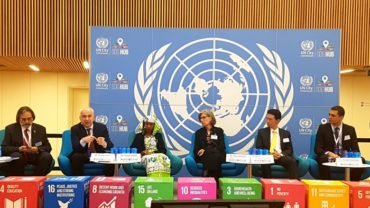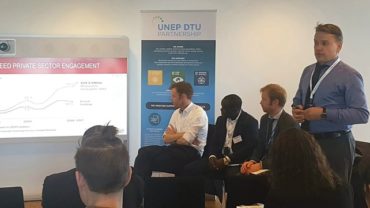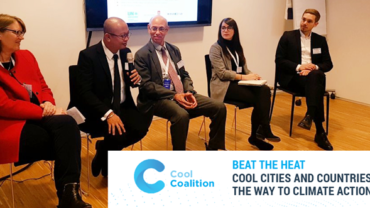Participants at Copenhagen conference on SDG and climate action synergies say strengthened relationship between climate, SDGs provide our best opportunity for systemic change to ensure no one left behind
With the urgency of climate action at an all-time high, global experts and leaders meeting in Copenhagen identified key immediate action areas to better serve both the world’s efforts to achieve the goals of the Paris Agreement and the Sustainable Development Goals (SDGs), aiming to ensure better lives for all people.
Nearly 400 participants from around the world came together for the first Climate and SDGs Synergy Conference—formally the “Global Conference on Strengthening Synergies between the Paris Agreement and the 2030 Agenda for Sustainable Development”.
They agreed that a stronger connection between the implementation of the Paris Agreement and the 2030 Agenda for Sustainable Development provides the world’s best opportunity for positive, systemic change that will ensure a sustainable and inclusive development in a healthy environment for present and future generations.
The conference was organized by the United Nations Department of Economic and Social Affairs (UN DESA), UNFCCC and the Danish Ministry of Foreign Affairs and Ministry of Energy, Utilities and Climate in collaboration with UNEP DTU Partnership and UNOPS.
Achieving synergies and eliminating trade-offs
During the conference UN Under-Secretary-General for Economic and Social Affairs Liu Zhenmin argued, that policies, programmes and partnerships must be designed to work together, to achieve synergies and reduce or eliminate the trade-offs.
“There are many places where such convergence is possible—for example, energy transitions are at the heart of lowering greenhouse gas emissions. These also hold the potential for eradicating poverty, creating jobs, improving health and contributing to more sustainable ecosystems,” he said.
Speaking on behalf of the UN Climate Change secretariat, Deputy Executive Secretary, Ovais Sarmad, said: “Climate change is a threat multiplier. If we don’t act urgently and with more ambition, it will destabilize the global economy, create conflict, displacement and cause incredible suffering for people everywhere. But climate change also provides our single greatest opportunity to build a safer, healthier, more resilient and prosperous world and by further linking the climate and SDGs process, we can drive transformative action at all levels.”
Input to the September Climate Summit
Climate change is the defining issue of our time, and while the world needs to move fast, the solutions must be fair. The world’s most vulnerable people are suffering the worst effects of climate change, while contributing least to the problem. The SDGs, which include the standalone SDG 13 on Climate Action, provide the best framework for tackling the climate emergency in ways that help everyone, in particular, women, children, youth, older persons, persons with disabilities and those living in small island developing states.
The Climate and SDGs Synergy Conference is a critical part of the UN’s comprehensive review of climate action in 2019. The conference will serve also as a preparatory Expert Group Meeting for SDG 13, which is one of the goals to be examined in-depth at this year’s High-level Political Forum on Sustainable Development (HLPF) in July. This review in Copenhagen of SDG 13 implementation will provide valuable context for the HLPF’s deliberations, which itself will inform the debate at the Secretary-General’s Climate Action Summit and the SDG Summit, both held in September.
Advantages of cooperative frameworks
Participants from developed and developing nations, including government representatives, youth, and members of the private sector, academia, civil society and the UN system, attended the conference.
They highlighted the opportunities, advantages and gains being made through cooperative implementation of climate action and the SDGs. Other post-2015 development frameworks, including the Sendai Framework for Disaster Risk Reduction and Addis Ababa Action Agenda on Financing for Development, was mentioned to provide other opportunities for synergies.
Additionally, during the conference, UN DESA and UNFCCC agreed to establish a global knowledge network and platform on the synergies between climate and SDGs, building on all the inputs to the conference, to be launched before the HLPF. UN DESA will work to identify and promote multi-stakeholder partnerships and commitments that can directly contribute to the Climate Action Summit and the SDG Summit in September.
A Cool Coalition
Participants discussed several new multi-stakeholder partnerships aiming to protect forests and the ocean, and boost efforts supporting sustainable energy.
For example, more than 20 leaders committed to the Cool Coalition, a new effort to accelerate action on the transition to clean and energy efficient cooling, which can help mitigate climate change, further sustainable development and save money.
Led by UN Environment, the Climate and Clean Air Coalition, the Kigali Cooling Efficiency Program, and SEforAll, the coalition includes the Ministers of Environment from Chile and Rwanda, the heads of the Danish engineering firm Danfoss and the French global energy utility Engie, as well as other leaders from civil society, academia and intergovernmental institutions. UNEP DTU Partnership will also be contributing through our involvement in SeforAll.
Get moving or get out of the way
Furthermore, young people at the Copenhagen conference made it clear that they stand ready to cooperate on efforts to achieve the SDGs and Paris Agreement—and in fact, are leading their own. Citing the 15 March School Strike for Climate as proof of the rising youth movement, Annisa Triyanti of Indonesia, representing the UN Major Group for Children and Youth (MGCY), said she and her peers worry that they are studying for a future that might not be there.
“Through hard and genuine work, we can be the voice of the voiceless,” she said at the conference opening session. “We have done our homework. Now it is your turn and we’re ready to work together.”
Kristian Jensen, the Minister of Finance of Denmark, said he stands ready to meet young people’s high expectations—and encouraged other finance ministers to join these efforts.
“The message from youth around the world on climate and SDG action is loud and clear: Get moving or get out the way,” Jensen said. “That is why we need all hands on deck—including ministers for finance. Because we need to put action behind the promises we made. If we do this, I am convinced we can deliver on the Paris Agreement and the 2030 Agenda.”
Further information:
The Conference outcome document and further details can be found here


